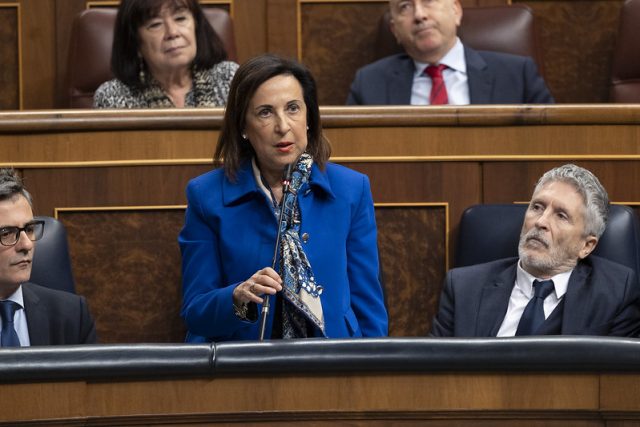
A fresh wave of criticism has emerged against Spain’s government, led by Prime Minister Pedro Sánchez, over the controversial and frequent use of the official Falcon jet for trips to the Dominican Republic. According to Defence Minister Margarita Robles, a total of 62 Falcon landings have taken place in the Dominican Republic during Sánchez’s tenure. However, her attempts to provide clarification have only deepened public scepticism, fuelling accusations that the PSOE-led administration treats public resources as extensions of party privilege.
The Falcon jet, officially designated for government business and state duties, has been at the centre of criticism throughout Sánchez’s time in office. Although the aircraft is intended to support essential state affairs, evidence suggests that it has been used for purposes not directly related to governmental responsibilities. Robles has claimed that most of the flights were “technical stopovers” during intercontinental routes. However, critics argue that such a large number of stopovers in a single location with limited strategic importance to Spain’s diplomatic or commercial interests raises significant questions about its justification.
The opposition parties have not remained silent. Representatives from the Popular Party (PP) and VOX have accused Sánchez’s administration of treating the state’s resources as party assets, with several figures calling for a detailed breakdown of the nature and purpose of each of the 62 Falcon flights.
Margarita Robles’ recent appearance in the Senate was meant to defuse the controversy.
During the session, Robles corrected her earlier statement that only 59 flights had occurred, revealing that the true figure was actually 62.
The lack of transparency surrounding these flights has done little to ease public frustration. At a time when Spain faces significant economic and social challenges, the use of public resources for purposes that remain unexplained is especially troubling. With inflation on the rise and increasing financial pressure on ordinary Spaniards, the apparent mismanagement of state assets reflects a tone-deaf approach from the Sánchez administration. Critics argue that it highlights a disconnect between government rhetoric and its actions, with calls for austerity directed at citizens while public officials seemingly operate without restraint.
The Falcon controversy is emblematic of a broader trend under Sánchez’s leadership—a government that often appears more focused on self-preservation than on ethical governance. This pattern of questionable decision-making is not new. The deals made with Basque and Catalan separatist parties to maintain a governing coalition are frequently cited as another example of this approach.
Public scrutiny of the government’s use of official resources has intensified in recent years, with calls for independent investigations into state spending. Many citizens and civil society organisations are now demanding a full audit of Falcon jet usage.
Rather than addressing the criticism directly, Sánchez and Robles have opted for a defensive strategy, offering unconvincing explanations. They have attempted to downplay the controversy, a move that has only emboldened critics.
The use of the Falcon jet, which could have been a routine matter of state logistics, has become a symbol of a much larger issue. Citizens, especially those grappling with rising living costs, see it as a flagrant example of privilege and mismanagement. For a government that brands itself as progressive and people-focused, this controversy is a glaring contradiction.
The scandal over Falcon flights underscores a larger problem in Spain’s political system: the unchecked use of public resources. Without a formal system of accountability and independent scrutiny of how official resources are utilised, incidents like this will continue to surface. For Pedro Sánchez and his government, the controversy represents an opportunity to restore public trust—if they are willing to embrace reform. But if the current strategy of deflection and dismissal continues, the cost will not only be political; it will be the erosion of public confidence in Spain’s democratic institutions.



 Subscribe
Subscribe